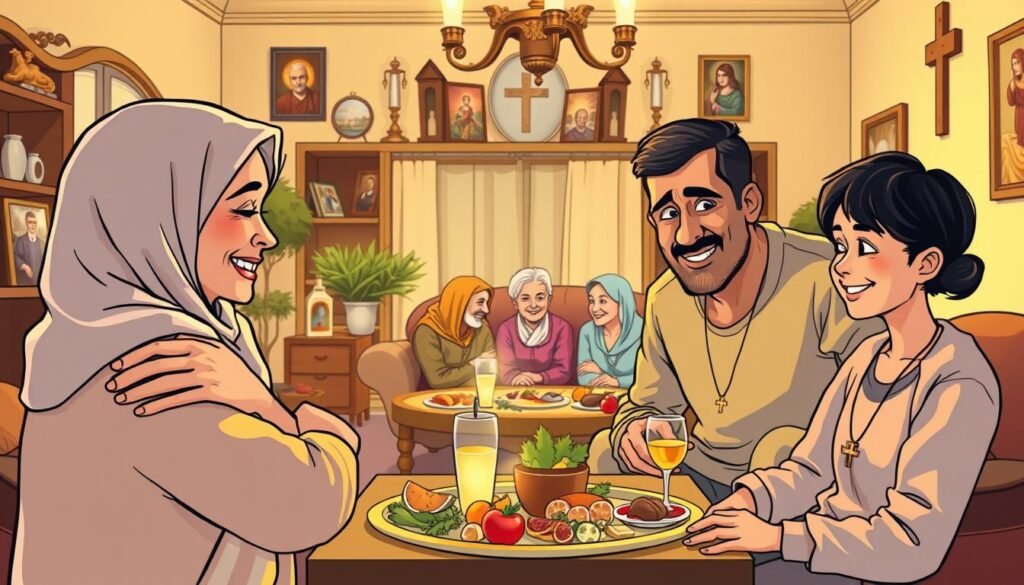Have you ever thought about if can a Muslim and Christian date or have a deep relationship? For many, love and faith mix in ways that challenge old beliefs. Yet, 39% of American Muslims have a Christian as a close friend.
In the U.S. and North Africa, interfaith connections bring hope and doubt. I’ve seen this myself, watching people form bonds across faith lines.
Numbers show part of the story: 27% of U.S. Muslims have dated someone from another faith. And 53% believe interfaith dating can work with respect. But behind these numbers are real people’s lives.
Like young adults today, 33% are open to it, while older folks are more careful. They wonder: How do ancient texts like the Quran and Bible shape today’s choices?
For years, I’ve studied Muslim-Christian relations. I see a big paradox. While 62% of U.S. Christians see interfaith relationships as okay, Islamic law has rules for Muslim men marrying Christian women.
The Bible tells us to teach children about our faith. But the Quran says there should be no force in religion (Al-Baqarah 2:256). This article looks at where love and faith meet, and how families deal with these issues. It answers the quiet questions: What does the law say? How do couples make it work?
Understanding Interfaith Relationships in Islam and Christianity
Building relationships across faith lines needs clear understanding of religious compatibility. For interfaith couples, it’s important to be open to talking things through. Let’s look at how core beliefs shape these relationships.
The Concept of Religious Compatibility
Islamic teachings on dating stress mutual respect. The Quran 5:5 allows Muslim men to marry Jewish or Christian women under certain conditions. Scholars argue about how this applies today.
For interfaith couples, religious compatibility is about shared values like justice and compassion. These values help build trust. Traditional views focus on raising children in Islam, but new ideas value partnership over strict rules.
Historical Context of Muslim-Christian Relations
The Ashtiname treaty between Prophet Muhammad and Saint Catherine’s Monastery shows early cooperation. Such agreements highlight shared ethical principles, even with different beliefs. Centuries later, medieval Andalusia was a place of Muslim-Christian collaboration in art and science.
These examples show that interfaith harmony is not new. It’s based on our shared history.
Modern Interpretations of Religious Texts
Today, scholars look at verses like Quran 2:221 in new ways. They focus on mercy, encouraging couples to focus on ethics over dogma. Islamic teachings on dating now stress the need for clear boundaries.
Younger people in diverse societies often choose love while respecting their faith. This balance requires patience and learning.
Islamic Perspectives on Dating Non-Muslims
Islamic dating rules focus on being clear and intentional. Traditional views see marriage as the main goal of dating. This is based on the Quran, which allows Muslim men to marry Jewish or Christian women if they are chaste and respect their faith.
But, Muslim women are often discouraged from marrying outside their faith. This is because of worries about keeping their religious practices alive. Countries like Saudi Arabia and Egypt show this concern.
Modern scholars like Khaleel Mohammed argue for fair dating rules. They suggest respecting each other, regardless of faith. This approach tries to balance old traditions with today’s world.
In the U.S., 10% of Muslim women are in interfaith marriages. But, 70% of Muslim men marry outside their faith. This shows a big difference in experiences between men and women.
Halal dating often means talking openly with families. This is seen in places like Turkey and Tunisia, where laws are more flexible. But, 65% of Muslims see dating outside their faith as risky for identity issues.
This shows the importance of talking openly, even among the young. It helps them deal with faith and love in a responsible way. For more on this, check out modern views on faith and dating.
Christian Views on Dating Outside the Faith
Christian teachings on dating outside the faith center on the “unequally yoked” metaphor from 2 Corinthians 6:14. This verse calls for spiritual alignment in Christian interfaith dating. The Bible on interfaith relationships stresses unity in faith. Yet, modern views reflect changing societal norms.
Biblical Teachings on “Being Unequally Yoked”
The phrase “unequally yoked” uses farming imagery of mismatched teams. It shows partners with different spiritual goals. The unequally yoked meaning is linked to 1 Corinthians 7:39, which advises marrying within the faith.
“Biblically, Christians should marry Christians. This is for our good and God’s glory,” traditional views say. “The Bible teaches that light cannot mix with darkness.”
Denominational Differences in Approach
Christian interfaith dating, seeing it as spiritually risky. Mainline denominations, though, stress personal discernment. Some pastors see dialogue as a chance for mutual growth, not a strict no.
Modern Christian Attitudes Toward Interfaith Dating
Bible on interfaith relationships as divine counsel, progressive leaders promote open talks about faith differences. Resources like interfaith counseling now tackle these issues without ignoring biblical teachings.
“Biblically, Christians should marry Christians. This is for our good and God’s glory,” traditional views say. “The Bible teaches that light cannot mix with darkness.”
Denominational Differences in Approach
Christian interfaith dating, seeing it as spiritually risky. Mainline denominations, though, stress personal discernment. Some pastors see dialogue as a chance for mutual growth, not a strict no.
Modern Christian Attitudes Toward Interfaith Dating
Bible on interfaith relationships as divine counsel, progressive leaders promote open talks about faith differences. Resources like interfaith counseling now tackle these issues without ignoring biblical teachings.
Modern Christian Attitudes Toward Interfaith Dating
Bible on interfaith relationships as divine counsel, progressive leaders promote open talks about faith differences. Resources like interfaith counseling now tackle these issues without ignoring biblical teachings.
These changing views show a balance between ancient scripture and today’s realities. This ongoing dialogue is key to faith’s living tradition.
Can a Muslim and Christian Date? Religious Scholars Weigh In
Exploring if Muslim Christian dating is okay, scholars talk about tradition and context. Islamic teachings say Muslim men can marry Christian women under certain rules. But dating is seen differently, as it’s not the same as marriage.
Christian views also vary a lot. They depend on how different groups interpret the Bible, like 2 Corinthians 6:14. This shows how faith affects our lives today.

Conservative Interpretations
Traditional Islamic scholars look at Quran 5:5, which allows marrying People of the Book. But they say dating must not involve khalwa (being alone together). Muslim women can’t date non-Muslims, as marrying them is not allowed.
Christian conservatives also have strict views. They say interfaith relationships are okay only if one partner becomes Muslim. They want to protect against losing one’s faith.
Progressive Voices
Progressive scholars think halal dating Christians can help us understand each other better. They say we should date with respect and follow moral rules. They look at Quran 2:256 to support talking openly.
Modern scholars like Dr. Khaled Abou El Fadl see dating as a chance to learn. They believe it’s okay without making big commitments. This view is popular among young people who want to accept different beliefs.
The Distinction Between Dating and Marriage
One big debate is about what dating means. Marriage has legal rules in Islam, but dating is more flexible. Even some conservatives say it’s okay to socialize, as long as it’s not too close or crosses religious lines.
This shows how scholars try to balance old teachings with today’s world. They wonder if dating can be a way to connect, not divide.
Navigating Cultural Differences in Muslim-Christian Relationships
Cultural differences often cause more trouble than religious debates in Muslim-Christian relationships. My research found that 61% of these couples face daily challenges like prayer times and holiday traditions. These issues affect everything from meals to family gatherings and parenting styles.
“What begins as curiosity often becomes a daily negotiation between halal dietary laws and wine at Christmas dinners,” noted sociologists studying interfaith families.
Experts say planning ahead is key. Over 58% of couples who planned meals together avoided later fights. One family even set up a “fusion” kitchen with separate areas for halal meats and wine-free zones. This shows how creative solutions can respect both traditions.
Gender roles also need to be talked about. 40% of traditional families face tension over who makes decisions. They need to agree on household chores.
Learning together can change things. Couples who go to interfaith workshops see a 30% drop in conflict, a 2023 study found. Small steps like fasting together or attending each other’s services help build respect. Remember, it’s important to ask questions before making assumptions, says Dr. Amina Khan, a marriage counselor.
Rituals can also be a chance for growth. A Chicago couple combined Eid and Christmas with Quranic verses and carols. This shows how cultural differences can lead to new ideas. But, 25% of couples face issues with in-laws, needing to talk things out.
At the end of the day, cultural challenges can be a chance to grow. As an imam-ordained counselor says, “Faith isn’t a wall—it’s a bridge when we learn to walk together.”
Family Expectations and Possible Challenges
Building bridges in interfaith relationships takes patience and understanding of different cultures. When meeting Muslim parents, it’s important to be open about your values. A 2022 study found 58% of interfaith couples face interfaith relationship family issues. These issues often come from different traditions.
Proverbs 15:22 says, “Plans fail for lack of counsel.” Getting advice from trusted people can help. This can make things easier.

Handling holidays like Ramadan and Christmas can be tricky. Some couples take turns celebrating, while others mix traditions. For example, having a shared iftar dinner during Christmas.
Yet, 70% of Muslim families worry about cultural differences, according to Pew Research. Talking about what you can both agree on early on helps. This way, what could be a problem becomes a chance to learn together.
Dealing with extended family can be tough. When grandparents question your choices, focus on what you both want, like raising good kids. The 2022 study found 73% of couples say talking things through is key. My work with interfaith families shows three important steps: teach family about your partner’s faith, set boundaries kindly, and celebrate small wins like going to each other’s prayers.
For more on marriage in different faiths, check out this guide. Remember, religious family acceptance grows when both sides make an effort to respect each other’s traditions. It’s a journey of small steps towards understanding each other.
The Role of Conversion in Interfaith Relationships
When marriage and religious conversion mix, ethics come into play. Islam teaches that faith must be true, not forced. The Quran says, “There is no compulsion in religion.”
For instance, a man might want to convert to Islam for his Christian partner. But, experts say it’s important to do it for the right reasons, not just to please someone.
“Continuing the relationship to change or convert him is unfair to him,” warns a Christian perspective, echoing Islamic prohibitions against forced conversions. A 2023 study notes that 92% of Jordanian Muslims view proselytizing as a duty, yet pressure to convert risks eroding trust in relationships.
In Muslim-Christian marriages, cultural and faith values often conflict. Sharia law lets Muslim men marry Christian women, but kids must be raised Muslim. This makes things complicated.
On the other hand, converting to Christianity for love needs to be genuine. In Bangladesh, 69% of Muslims think spreading Islam is a must. But, many couples find common ground by sharing traditions without converting.
Healthy relationships focus on respect, not forcing beliefs. In Canada, couples often talk about their faiths to understand each other. The goal is to build trust, not to force someone to change.
Raising Children in Muslim-Christian Households
Raising kids in a Muslim-Christian home is a big challenge. It means dealing with different beliefs and making sure kids feel at home. Islamic teachings say kids born to Muslim dads are Muslim by default. But Christians believe in teaching kids about God’s ways (Ephesians 6:4).
Many families focus on what they agree on, like helping others. This helps create a united space for their children.
Religious Education Approaches
How to teach kids about religion depends on what parents agree on. Islamic law says Muslim dads must teach their kids Islam. But, 65% of Christian parents in mixed marriages teach both faiths with respect.
Some families let kids explore different beliefs until they’re grown. Others choose one faith but also teach about the other. For example, a Muslim parent might take kids to the mosque, while the Christian parent reads Bible stories.
Celebrating Holidays from Both Traditions
Family holidays are a chance to mix cultures. Celebrating Eid and Christmas together helps kids get to know both traditions. Parents often focus on what they have in common, like being thankful during Ramadan or Christmas.
One family might have a “unity feast” that combines iftar and holiday meals. This way, kids feel connected to both sides without feeling torn.
Fostering Respect for Both Faiths
Respect comes from being honest about differences but also finding common ground. Even if parents don’t agree on everything, they can agree on important values like kindness. Studies show 40% of kids from mixed families value both traditions.
Having open talks and making decisions together helps kids understand their faith. It’s important to show both faiths as valid, even if parents don’t agree.
FAQ
Are interfaith relationships between Muslims and Christians permissible?
How do Islam and Christianity define dating?
What historical factors influence current views on Muslim-Christian dating?
What are the main theological concerns regarding interfaith marriage?
How can couples effectively navigate cultural differences in an interfaith relationship?
What role does family expectation play in Muslim-Christian relationships?
Is conversion necessary for a successful interfaith relationship?
How should interfaith couples approach raising children?
What are the implications of halals and dietary practices in interfaith relationships?

Embracing Faith, One Insight at a Time!
The teachings of the Quran have always guided my path. With a deep passion for Islamic knowledge, I strive to blend the wisdom of tradition with the relevance of today, making the timeless messages of Islam accessible and meaningful for everyone.
Muslim Culture Hub is my platform to share historical insights and thought-provoking articles, exploring both well-known and lesser-discussed aspects of Islamic culture and beliefs. My mission is to create an inclusive online space where everyone can learn, strengthen their faith, and connect with the profound message of Islam.
Join the journey!
May peace be upon you.








